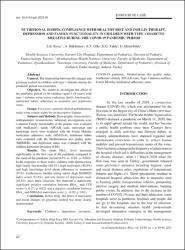| dc.contributor.author | Koca, Serkan Bilge | |
| dc.contributor.author | Bükülmez, Ayşegül | |
| dc.contributor.author | Tolunay Oflu, Ayşe | |
| dc.contributor.author | Gürhan Tahta, Evrim | |
| dc.contributor.author | Demirbilek, Hüseyin | |
| dc.date.accessioned | 2022-09-15T10:51:46Z | |
| dc.date.available | 2022-09-15T10:51:46Z | |
| dc.date.issued | 2022 | en_US |
| dc.identifier.citation | Koca, S. B., Bükülmez, A., Oflu, A. T., Tahta, E. G., & Demirbilek, H. (2022). NUTRITIONAL HABITS, COMPLIANCE WITH HEALTHY DIET AND INSULIN THERAPY, DEPRESSION AND FAMILY FUNCTIONALITY IN CHILDREN WITH TYPE 1 DIABETES MELLITUS DURING THE COVID-19 PANDEMIC PERIOD. Acta Endocrinologica (Bucharest), 18(1), 40-48. | en_US |
| dc.identifier.issn | 1843-066X | |
| dc.identifier.uri | https://doi.org/10.4183/aeb.2022.40 | |
| dc.identifier.uri | https://hdl.handle.net/20.500.12933/1416 | |
| dc.description.abstract | Context. The relationship between life changes and glycemic control in children with type 1 diabetes during the pandemic period was examined. Objective. We aimed to investigate the effect of the pandemic period on 66 children (aged 5-18 years) with type 1 diabetes using scales evaluating family functionality, nutritional habits, adherence to treatment and depression status. Design. It is a cross-sectional clinical and laboratory study using certain scales for its descriptive features. Subjects and Methods. Demographic characteristics, anthropometric measurements, laboratory investigations were evaluated. Family functionality of the patients were evaluated with Smilkstein’s family APGAR scale, motivation and knowledge levels were evaluated with the 6-item Morisky medication adherence scale (MMAS-6), nutritional habits were evaluated with the Mediterranean diet quality index (KIDMED), and depression status was evaluated with the children depression inventory (CDI). Results. The mean HbA1c level increased significantly in the first year of the pandemic compared to the onset of the pandemic period (8.5% vs. 8.9%, p: 0.003). In the responses to these scales, children with diabetes have high family functionality (89.4%), high motivation (90.9%) and high knowledge level about adherence to treatment (97%). Furthermore, healthy eating habits (high KIDMED index scores 92.4%), and low degree of depression score (95.5%) have been observed. We detected a statistically significant positive correlation between HbA1c and CDI scores (r: 0.27; p: 0.02), and a negative correlation between HbA1c and MMAS-6 motivation score (r: -0.30; p: 0.01). Conclusions. In this study, the effect of motivation and mood changes on glycemic control was more clearly demonstrated. | en_US |
| dc.language.iso | eng | en_US |
| dc.publisher | Acta Endocrinologica Foundation | en_US |
| dc.relation.isversionof | 10.4183/aeb.2022.40 | en_US |
| dc.rights | info:eu-repo/semantics/openAccess | en_US |
| dc.subject | Children’s depression inventory | en_US |
| dc.subject | COVID-19 pandemic | en_US |
| dc.subject | Mediterranean diet quality index | en_US |
| dc.subject | Smilkstein’s family APGAR scale | en_US |
| dc.subject | Type 1 diabetes mellitus | en_US |
| dc.subject | 6-item Morisky medication adherence scale | en_US |
| dc.title | Nutritional Habits, Compliance with Healthy Diet and Insulin Therapy, Depression and Family Functionality in Children with Type 1 Diabetes Mellitus During the Covid-19 Pandemic Period | en_US |
| dc.type | article | en_US |
| dc.authorid | 0000-0002-6013-5172 | en_US |
| dc.department | AFSÜ, Tıp Fakültesi, Dahili Tıp Bilimleri Bölümü, Çocuk Sağlığı ve Hastalıkları Ana Bilim Dalı | en_US |
| dc.contributor.institutionauthor | Bükülmez, Ayşegül | |
| dc.contributor.institutionauthor | Tolunay Oflu, Ayşe | |
| dc.contributor.institutionauthor | Gürhan Tahta, Evrim | |
| dc.identifier.volume | 18 | en_US |
| dc.identifier.issue | 1 | en_US |
| dc.identifier.startpage | 40 | en_US |
| dc.identifier.endpage | 48 | en_US |
| dc.relation.journal | Acta Endocrinologica | en_US |
| dc.relation.publicationcategory | Makale - Uluslararası Hakemli Dergi - Kurum Öğretim Elemanı | en_US |
















